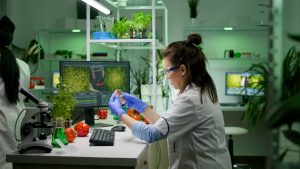
[Freepik: pressfoto]
Are you wondering whether focusing on biology is the right choice for your career path?
Opportunities for biology graduates have expanded significantly over the years, offering a wealth of exciting prospects. And Singapore is well-positioned to help its students tap into these prospects.
So, how can YOU BENEFIT from these incredible opportunities? Read on to know more!
Singapore: The Centre of Biomedical Innovation
We all know of Singapore as a thriving trade hub. But among many of our achievements, did you know that our country has also earned a significant reputation as a leader in biomedical innovation in Asia?
In fact, our government has invested significantly in the development of life sciences and biotechnology, which further boosts the job prospects in this department. Today, there is a wide array of possibilities in these bioresearch and development centres.
To give you one example, the famous research and development hub for biomedical sciences, Biopolis, is one of Singapore’s initiatives to push for Biology-related fields. There are also other institutions like the Genome Institute of Singapore, the Bioprocessing Technology Institute, and the Bioinformatics Institute that are leading innovation and research in our country.
If you’re considering a future in biology or a related career and wish to use your knowledge, this article will serve as a quick guide!
You can navigate the index below to your favourite biomedical fields.
What Steps to Take to Pursue a Career in Biology After College?

[Freepik: tirachardz]
As you know, you can pick biology as an elective at the secondary level in school. After completing secondary levels, you can study biology at Junior College or write the A-levels. At Junior College, once again, you can choose a combination of science subjects that will provide you with a strong foundation in biology.
Pursuing a diploma program in one of the polytechnic institutions is also possible. Alternatively, you can also choose to do an IB program before joining the university to focus on a biology-related major.
At this stage, you would have completed the prerequisites to be adequately educated in a field within Biology.
So, what’s next? How can you pursue a career in biology after college?
To begin, we will start with an entry-level answer – an internship.
Start as an Intern
Internships are the stepping stones in finding the right jobs. Internships provide exposure to different sectors within biology, helping you understand various job roles and industries. They also offer practical experience and help you build relevant skills.
For instance, if you are interested in a career as a Research Scientist, you can try for an internship in a laboratory. There are also prominent medical research institutions in Singapore, like A*STAR, awarding research internships to undergraduate students.
On the other hand, if you prefer to become an Environmental Policy expert, you can try for an internship with government agencies or NGOs like ZeroWasteSG or Nature Society.
No matter your chosen field, you will find internship positions here in Singapore. However, the competition to intern in prestigious institutions can be fierce. As such, you will have to apply early.
Network With Those In The Industry

[Freepik]
The next most important part of your biology career will be networking. You can connect with professionals in the field by attending industry events, seminars, and conferences. Networking provides valuable insights, mentorship possibilities, and potential job leads.
In fact, universities often host networking events. Some examples include the LKCMedicine EArly Researcher Network at the Nanyang Technology University and the student interest groups at the Duke-NUS Medical School. You can also find dedicated biology student groups and professional networking events via Facebook and LinkedIn.
Utilise Student Resources
Your university or college is also likely to have dedicated career services and resources. Ensure you attend career fairs, career coaching, workshops, and counselling sessions to receive guidance on job searches, resume building, and interview preparation.
What’s more, even your college alumni can be of great help in guiding you to find the right job or specialisation.
Explore Job Platforms and Boards
Finally, the point of all these efforts is to find a relevant job. To do so, it is inevitable for students to peruse multiple job platforms and company websites every day. But more importantly, you need to be proactive and sell yourself as a well-read graduate just looking for an opportunity to grow your career alongside the company!
Is there a specific industry that you’re looking to enter? If so, be sure to check the appropriate search filters in order to limit your job hunt only to specific prospects! There are also specialised job boards or websites, such as Nature Careers, dedicated to biology-related careers.
Remember that you’re not alone in this race! Read what some of these job listings require of their applicants, and tailor your resume and skills to match the competition!
Stay Informed About Industry Trends

[Freepik]
The world of science is always evolving. As such, it is imperative to stay updated on current trends and developments in the field of biology, even after getting a job. Being aware of industry changes and advancements can make you more knowledgeable during interviews and networking opportunities.
For example, there are dedicated medical and biology journals that could help with that. Some of the top biology-related publications in Singapore include the Singapore Medical Journal, International Journal of Surgery, and Annals. Additionally, there are also webinars and online articles that cover the latest advancements in the field.
What Kind of Biology Jobs Can I Look For?
Throughout your academic milestones, you and your peers are given enough time to hone in on various specialisations.
As such, the job opportunities will also vary according to this difference.
From being a doctor to being a biotech analyst, the options in the biomedical field are virtually endless. Below, we have outlined some of the best career opportunities biology students can pursue. We have categorised them for your easy perusal.
To help you further, we have included requirements for popular career choices in this article.
Healthcare and Medicine
One of the most popular routes in the biology-related sector is healthcare and medicine. Here are some of the career types you can consider in this field.
1. The Most Obvious Career to Choose – Become a Doctor!

[Freepik: tirachardz]
Needless to say, being a doctor is one of the most respected and vital professions, not only in Singapore but across the world. Physicians play a crucial role in patient care, providing medical advice, prescribing medications, and performing medical procedures. Depending on your interest, you can specialise in various fields such as internal medicine, surgery, neurology, psychiatry, paediatrics, or obstetrics and gynaecology.
What Can I Look Forward to?
Becoming a doctor in Singapore promises a fulfilling career with opportunities to work in world-class healthcare institutions, like the Singapore General Hospital, the National Cancer Centre Singapore, and the National University Hospital. You can expect intellectual challenges, a dynamic work environment and diverse medical specialities.
You will also get exposure to new medical technologies, especially while working in Singapore, where the standard of health care offered is taken quite seriously. Needless to say, the most important thing is the commitment to upholding high standards in patient care.
Required Qualifications
For secondary school students, the first step to becoming a doctor is to choose a high school curriculum focused on science subjects such as biology, chemistry, and mathematics. Then, you can take the following steps:
- Obtain a recognised bachelor’s degree in medicine.
- Undergo internship and residency programs to gain practical experience.
- Register with the Singapore Medical Council (SMC) upon completion.
- Pass the licensing examination to practise medicine in Singapore.
Career Prospects
The career prospects of doctors are quite promising. Our healthcare system is renowned for its high standards, providing a conducive environment for professional growth and development.
- Doctors have opportunities to work in public hospitals and private clinics or pursue specialised fields in research and academia. However, bear in mind that getting a specialisation can take up to eight years after graduation.
- There is also scope for continuous professional development as Singapore’s medical standards offer global recognition.
- Doctors can also pursue specialisations like surgery, paediatrics, or cardiology to advance their careers.
Would you like to know a fun fact? In Singapore, the largest number of specialists belong to Anesthesiology, followed by Diagnostic Radiology. And the lowest number of specialists are in Pediatric Surgery. This statistic will give you an idea of which specialisation to choose if pursuing medicine.
2. What About Becoming a highly skilled and Compassionate Nurse?

[Freepik: jComp]
Nurses also play a critical role in patient care and can thus be a rewarding profession to pursue. They assist doctors in various medical settings and coordinate overall treatment plans.
What Can I Look Forward to?
Nursing in Singapore offers a dynamic career path with a multitude of opportunities. You will be experiencing the fulfilling aspect of direct patient care and will be able to learn continuously.
More importantly, you will find deep satisfaction in making a meaningful impact on patient well-being, contributing to the healthcare community, and being an integral part of a profession that prioritises the health and welfare of others.
Required Qualifications
Here are the steps to become a nurse in Singapore:
- Students can pursue a diploma or a degree in nursing at prominent colleges in Singapore listed above.
- After completing the nursing program, you must pass the Singapore Nursing Board (SNB) Examination and register with the Singapore Nursing Board.
Career Prospects
Singapore offers a clear pathway for career growth, with opportunities to advance into leadership roles or specialise in specific nursing fields. If you become a nurse, you can find employment in public hospitals, private clinics, and community healthcare.
- You can also specialise in areas such as oncology, cardiology, or paediatrics.
- Nurses with experience in Singapore may find opportunities to work in other countries or collaborate on international healthcare projects.
- The Ministry of Health even offers a Healthcare Professional Conversion Programme for those who wish to pursue nursing halfway through their career.
3. Want to Prescribe Smiles? Consider Being a Pharmacist

[Freepik: Krakenimages]
Pharmacists ensure the safe and effective use of medications. As a pharmacist, you will be dispensing prescriptions, providing medication counselling to patients, and managing medication therapy. You will also be collaborating with healthcare professionals.
What Can I Look Forward to?
Embarking on a career as a pharmacist in Singapore opens doors to a profession that plays a vital role in healthcare. You will engage directly with patients, provide medication counselling, and foster positive health outcomes.
Moreover, you will also be at the forefront of medical advancements, which can contribute to your professional growth. In Singapore, pharmacists can also venture into different pharmaceutical specialisations, such as academia, research, regulation, etc.
Required Qualifications
To become a pharmacist in Singapore, the following qualifications are typically required:
- Obtain a recognised bachelor’s degree in pharmacy or a related field from an accredited institution.
- Register with the Singapore Pharmacy Council (SPC) upon graduation.
- Complete a structured internship or practical training program to gain hands-on experience.
- Pass the Singapore Pharmacy Qualifying Examination (SPQE) administered by the SPC.
- Gain clinical experience, which may involve working in hospitals, community pharmacies, or other healthcare settings.
Career Prospects
If you are looking to build a career as a pharmacist, this is what you can anticipate.
- Work in hospitals, community pharmacies, pharmaceutical companies, and regulatory bodies. In fact, according to the SPC, 88.5% of pharmacists in Singapore have full-time or part-time jobs, a statistic not to be taken lightly.
- Opportunities in sales and marketing and research and development of pharmaceutical products.
- Involvement in regulatory affairs, ensuring compliance with pharmaceutical regulations.
- Entrepreneurial prospects, such as owning and managing a community pharmacy
Biotechnology and Data Science
4. Combine Biology and technology to Become a Biotechnologist

[Freepik: Krakenimages]
The biotechnology field has also had a significant rise over the years. Biotechnologists apply biological principles to develop innovative technologies and products. This profession requires you to have a strong foundation in biology.
What Can I Look Forward to?
As a biotechnologist, you will engage in groundbreaking biomedical research, contributing to advancements in fields like genetics, genomics, and personalised medicine. You could eventually be one of the heroes working on the next big scientific breakthrough!
Required Qualifications
To become a biotechnologist in Singapore, individuals typically need to fulfil certain educational qualifications and acquire relevant skills. Here are the typical qualifications:
- Complete a bachelor’s degree in biotechnology, molecular biology, biochemistry, genetics, or a related field.
- While a bachelor’s degree is sufficient for entry-level positions, pursuing a master’s degree in biotechnology or a specialised area can enhance career prospects and open doors to advanced roles.
- Gain hands-on research experience through internships, projects, or laboratory work during undergraduate or postgraduate studies.
- Acquire technical skills relevant to biotechnology, such as molecular biology techniques, genetic engineering, bioinformatics, and laboratory methodologies.
Career Prospects
Being a Biotechnologist in Singapore opens doors to a spectrum of innovative opportunities in the dynamic field of biotechnology.
- The number of biotech companies in Singapore is expected to double over the next decade, which will boost the job prospects of biotechnologists.
- In Singapore, Biotechnologists contribute to various fields, including healthcare, agriculture, environmental conservation, and industrial processes.
- You can also get into sectors such as genetic engineering, bioprocessing, and the development of biopharmaceuticals.
- Biotechnologists also thrive in Singapore’s vibrant start-up ecosystem, contributing to innovative ventures and entrepreneurial initiatives.
5. Help Grow Quality Food by Becoming a Food Technologist

[Freepik: DCStudio]
Food Technologists ensure the safety, quality, and efficiency of food production processes. As you know, we have stringent food safety standards in Singapore, and Food Technologists are responsible for developing and improving food products. This includes conducting quality-control tests and ensuring that products comply with regulatory standards.
What Can I Look Forward to?
Food Technologists work closely with production teams, conduct research on new ingredients and technologies, and implement measures to enhance the nutritional value and shelf life of food products.
Required Qualifications
Here are the typical qualifications to become a Food Technologist in Singapore:
- A bachelor’s degree in food science, food technology, food engineering, or a related field.
- Obtain relevant certifications in food safety, such as Hazard Analysis and Critical Control Points (HACCP) or ISO 22000.
- Develop strong analytical skills to evaluate and test food products for quality, safety, and compliance with regulations.
Career Prospects
According to The Straits Times, over 2,500 jobs will be created in the food sector in Singapore over the coming years, boosting demand for Food Technologists.
- Currently, there are job opportunities in various sectors, including food manufacturing, research and development, quality assurance, and regulatory affairs.
- You can also participate in research and development roles, contributing to innovation in food processing, preservation, and packaging.
- Food Technologists can also work as consultants, providing expertise to food companies on production processes, product development, and compliance.
6. Make Sense of Biological Data as a Data Analyst in Healthcare

[Freepik: DCStudio]
The role of Data Analysts is to extract insights from large sets of data to help make informed decisions. This profession is the perfect option for those who love technology as well as biology.
What Can I Look Forward to?
Data analysts can enhance the efficiency of biological research processes.
Within the realm of biology-related fields, data analysts can aid in biological research, genomics, epidemiology, and more. For instance, you could work closely with clinical trials and make informed decisions.
Required Qualifications
Here is what you need to do to become a data analyst:
- A bachelor’s degree in a relevant field such as statistics, mathematics, computer science, information technology, or economics.
- Alongside, you will also need a strong foundation in biology or life sciences obtained via a degree or experience.
- Additionally, proficiency in programming languages such as R or Python for medical data analysis, along with experience in statistical analysis and data visualisation tools, is essential.
- Employers also appreciate practical experience, which can be attained through internships.
Career Prospects
The demand for data analysts in the biology sector is on the rise.
- Our thriving bio-medical institutions have an increasing need for professionals who can analyse and interpret biological data effectively.
- As a Data Analyst, you may find opportunities in research institutions, pharmaceutical companies, healthcare organisations, hospitals, and government agencies involved in health and life sciences.
- Moreover, Singapore’s position as a global business hub provides opportunities for international collaborations and recognition for skilled data analysts.
Education and Research
For those with an academic spirit, there are several opportunities within the biology field that will allow you to have an enjoyable and lucrative career.
7. Love to Teach? Inspire Students as a Science Educator

[Freepik]
As the name suggests, a science educator is a teacher, a tutor, or a university professor in the biology-related sector.
What Can I Look Forward to?
Needless to say, becoming a teacher is highly prestigious and rewarding. You will be engaging with students, fostering scientific curiosity, and nurturing the next generation of scientists. Moreover, you will also be designing and delivering curriculum content.
Required Qualifications
Here are the qualifications you need to become a biology teacher or professor in Singapore:
- A bachelor’s degree in biology or a closely related field from a recognised institution.
- Complete a teacher training program or postgraduate diploma in education, specialising in biology education.
- Obtain certification from the National Institute of Education (NIE) in Singapore, which is responsible for training teachers.
- Complete a teaching practicum of at least ten weeks, gaining hands-on classroom experience under the guidance of experienced educators.
Career Prospects
There is always a consistent demand for biology teachers at the school and college levels in Singapore.
- If you wish to become a biology educator, you will be able to find employment in secondary schools, junior colleges, polytechnics, and universities.
- Moreover, educational research institutions also welcome professors and teachers with strong academic backgrounds.
- And what’s more, you can incorporate innovative teaching methods and technologies in biology education.
8. Write About Biology as a Science Journalist

[Freepik: pressfoto]
You might have already noticed that there are several scientific journals that publish biology-related articles and research. Science journalists break down complex concepts, often bridging the gap between scientific research and public understanding.
What Can I Look Forward to?
Journalists report on new discoveries, breakthroughs, and advancements in areas such as genetics, biotechnology, environmental science, and healthcare. Additionally, journalists also conduct interviews and attend scientific conferences.
Required Qualifications
If your goal is to become a science journalist, you will need the following qualifications and skills to become a science journalist:
- A bachelor’s degree in journalism, communications, science communication, or a related field, along with a strong background or thorough understanding of biology.
- Optionally, consider coursework or specialisation in science, scientific writing, or science journalism to gain a solid foundation in the subject matter.
- Gain hands-on experience through internships with media outlets, science publications, or online platforms.
- Build a strong portfolio of written work, including articles, blog posts, or reports.
Career Prospects
Science journalism continues to be an integral part of the information landscape.
- You can find positions at reputed traditional media outlets, online platforms, and science magazines.
- You can also be an independent science writer and start your own blog or publish your work.
- In fact, if you have a flair for writing, you can be a freelance biology writer while pursuing another related career.
9. Like Preserving The History of Biology? You Might Want to Become a Museum Curator

[Unsplash: Alina Grubnyak]
If your dream job is to work in a museum, then taking on biology in school can help with that, too. With a strong background in biology, you could be working in museums, acquiring, preserving, and displaying specimens related to biological sciences.
What Can I Look Forward to?
As a museum curator, you will have the opportunity to work closely with researchers, scientists and educators to design exhibits. You may also contribute to educational programs, workshops and other outreach activities.
Required Qualifications
Curious to become a museum curator? You will need to obtain the following qualifications first.
- A bachelor’s degree in a relevant field such as biology, zoology, botany, palaeontology, or a related discipline.
- A postgraduate degree in museum studies, curatorial studies, or a related field to gain specialised knowledge in museum management and curation.
- Hands-on research experience in biology or a related field, preferably with a focus on the specific area covered by the museum.
- Expertise in collection management, including cataloguing, preservation, and documentation of biological specimens
Career Prospects
Our country is home to a number of renowned museums. For example, the Lee Kong Chian Natural History Museum is dedicated to natural history, biodiversity, and biology-related collections – which provides opportunities for curators.
- There are also prominent scientific institutions, such as the Science Centre Singapore and the Singapore Discovery Centre, that would appeal to museum curators.
- As you gain experience, you can also advance into leadership roles, such as Chief Curator or Museum Director, overseeing the strategic direction and management of the entire museum.
10. Dive in Deep Into the World of Biology as a Research Scientist

[Freepik]
If you are a life sciences graduate, you also have a few different job options in the bioresearch sector.
What Can I Look Forward to?
Research scientists are primarily involved in designing and conducting experiments. Their responsibilities include analysing data, publishing research findings, and collaborating with interdisciplinary teams.
Research scientists could also specialise in genomics, stem cells, bioinformatics, immunology, and more.
Career Prospects
In a country like Singapore, where research and development are prioritised, job opportunities for biomedical researchers are constantly on the rise.
- Research scientists can work in diverse sectors, such as academia, pharmaceuticals, biotechnology, healthcare, environmental science, and government agencies.
- From academia and hospitals to research institutions and pharmaceutical companies, scientists are well in demand. For instance, A*STAR, NUS, NTU, and Duke-NUS have dedicated research centres that hire bio-research scientists on a regular basis.
Required Qualifications
Becoming a research scientist requires dedicating a few years of your life to education.
- A master’s degree may be sufficient for some entry-level research positions, but a Ph.D. is generally preferred for more advanced roles.
- You will also have to accumulate research experience during doctoral studies, including designing and conducting experiments, collecting and analysing data, and interpreting results.
- Demonstrate a strong publication record with articles in peer-reviewed scientific journals, showcasing the ability to contribute to the scientific literature.
Government and Policy
Make a change in the country! Be the action or voice that we need!
11. Be a Guiding Voice as an Environmental Consultant

[Freepik: Pressfoto]
Turn your passion for biology to become an environmental consultant.
What Can I Look Forward to?
In this role, you will advise businesses, government agencies, and organisations on environmental issues, sustainability practices, and regulatory compliance.
For instance, environmental consultants conduct environmental impact assessments (EIAs), identify potential environmental risks, and develop pollution control strategies and waste management strategies. Simply put, you will play a crucial role in ensuring that organisations operate in a manner that minimises their environmental impact.
Career Prospects
With the threat of climate change looming, the role of environmental consultants has become essential.
- By becoming a consultant, you can work with either government or private organisations.
- Opportunities exist in government agencies such as the National Environment Agency (NEA) and NGOs.
Required Qualifications
To become an environmental consultant, you will need a combination of educational qualifications, relevant skills, and research experience.
- Obtain a bachelor’s degree in environmental science, environmental engineering, biology, chemistry, or geology.
- Obtain relevant certifications, such as those from environmental organisations or professional bodies, to showcase expertise and adherence to industry standards.
- Acquire experience in a specific area of environmental consulting, such as air quality, water resources, environmental impact assessment, or sustainability.
- Stay informed about environmental regulations, policies, and compliance standards in Singapore, including those set by the NEA and other relevant authorities.
12. Take on a Public Role as a Public Health Officer

[Freepik: Pressfoto]
The last career opportunity on our list is to climb to the ranks of a Public Health Officer. This role requires candidates to have a thorough knowledge of public health, which further requires a background in biology.
The role of a Public Health Officer is multifaceted. It involves various responsibilities related to protecting and improving the health of communities. Furthermore, Public Health Officers work across different sectors to implement strategies, policies, and interventions that address public health challenges.
Career Prospects
Due to the diverse nature of this role, opportunities can also be found across different fields.
- For instance, Public Health Officers may work in hospitals, healthcare institutions, or research institutions like the National University of Singapore.
- Public Health Officers may also find opportunities within the Ministry of Health (MOH) to contribute to public health policies, disease surveillance, and health promotion initiatives.
Required Qualifications
Curious about what to do to become a Public Health Officer?
- Start by earning a bachelor’s degree in biology or a related field. While public health degrees are also common for this role, a biology degree can serve as a solid foundation, especially if you focus on courses related to epidemiology, microbiology, and health sciences.
- Public Health Officers also pursue a Master’s in Public Health (MPH) to gain specialised knowledge and skills.
- Registration with the Singapore Register of Public Health Professionals is essential and managed by MOH.
- You will also need to be familiar with Singapore’s public health policies, regulations, and healthcare system.
Are you Ready to Build your Biology Career?
It can be challenging to decide the right career path for your future. The field of biology offers a myriad of exciting and rewarding career opportunities, making it a dynamic choice for individuals passionate about the life sciences.
Whether pursuing a traditional path in research, academia, or healthcare or venturing into innovative sectors such as biotechnology, environmental science, or science journalism, the options are diverse and evolving.
Are you interested in learning more about your future career prospects? These articles can be of help!
